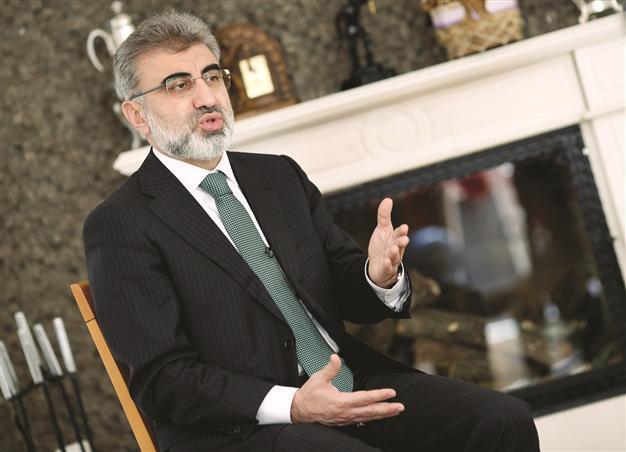Turkey may double Iran gas purchase if price issue solved: Energy minister
ANKARA

Turkey’s Energy Minister Taner Yıldız speaks during an interview with Reuters in Ankara. Yıldız has said natural gas purchases from Iran was a key topic in Prime Minister Tayyip Erdoğan’s Tehran visit. REUTERS photo
Turkey could double the amount of natural gas it imports from Iran if the two countries can agree on a price, Turkish Energy Minister Taner Yıldız said yesterday, a day after a visit to the Islamic republic.
In an interview with Reuters, the minister said natural gas purchases from the Islamic republic was a key topic during Prime Minister Recep Tayyip Erdoğan’s visit, but added that the two sides were still far from agreeing on a price.
“We have discussed how we could increase our imports to 20 billion cubic meters and the price mechanism needed for that,” Yıldız said, adding that Turkey had insisted on a reduction in the gas price.
Iran has responded by offering to sell more gas to energy-hungry Turkey and the offer is being considered, he said. “We have not found their price offer satisfactory at this stage,” he added.
“Obviously, without the price being agreed upon, we can’t sign such a deal. Our teams will continue to work on this,” Yıldız said.
Turkey has long maintained that Iranian gas prices are too high. Turkey’s state-owned Petroleum Pipeline Corporation (BOTAŞ) applied to an international court of arbitration in 2012 over the gas price in a case that is still pending.
Turkey depends on imports for almost all of its natural gas needs, which are expected to reach 52 billion cubic meters this year.
The $60 billion energy bill Turkey has to fund annually has been the biggest driver of its ballooning current account deficit and is seen as the main weakness of the economy.
“We have also discussed a barter system with Iran, through which we could swap various goods with energy imports,” Yıldız said, without giving further details.
During the interview, Yıldız also said Turkey would stand by a consensus reached in December 2013 between Ankara, Baghdad and Arbil to seek Baghdad’s permission, but not its blessing, in exporting Iraqi Kurdistan’s oil.
“Before the Baghdad trip, we were asked if we could say we will not be exporting any oil without Baghdad’s approval. We responded saying ‘No, we cannot,’” Yıldız said in an interview.
Yıldız traveled to meet Iraqi Deputy Prime Minister Hussain al-Shahristani in early December, en route to Arbil. His presence at an Arbil oil conference signaled Turkey’s determination in its ambitions in Iraqi Kurdistan.
The minister said during his visit there were intense talks among the three parties to identify a wording that would suit them all.
“And that’s how that consensus text was established. It was not set up only by Turkey. We stand by that text,” he said. “We also would like to have the consent of the central government of Iraq for the commercial export of oil from the KRG [Kurdistan Regional Government] to Turkey and start a trilateral cooperation scheme that will be beneficial to all,” the text read.
